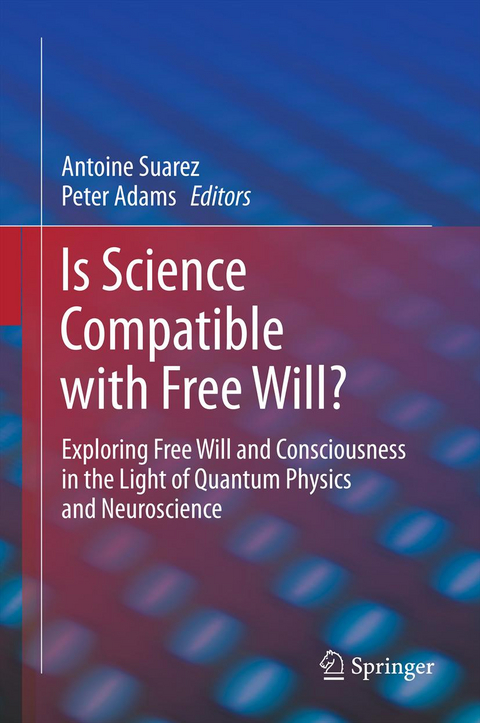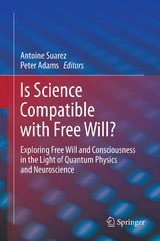Is Science Compatible with Free Will?
Springer-Verlag New York Inc.
978-1-4614-5211-9 (ISBN)
When faced with this conflict two alternative positions are possible: Either human freedom is an illusion, or deterministic neuroscience is not the last word on the brain and will eventually be superseded by a neuroscience that admits processes not completely determined by the past. This book investigates whether it is possible to have a science in which there is room for human freedom. The book generally concludes that the world and the brain are governed to some extent by non-material agencies, and limited consciousness does not abolish free will and responsibility.
The authors present perspectives coming from different disciplines (Neuroscience, Quantumphysics and Philosophy) and range from those focusing on the scientific background, to those highlighting rather more a philosophical analysis. However, all chapters share a common characteristic: they take current scientific observations and data as a basis from which to draw philosophical implications. It is these features that make this volume unique, an exceptional interdisciplinary approach combining scientific strength and philosophical profundity. We are convinced that it will strongly stimulate the debate and contribute to new insights in the mind-brain relationship.
Antoine Suarez, Center for Quantum Philosophy (Geneva and Zürich) and Social Trends Institute (Barcelona and New York). Dr Suarez' research is focused on quantum experiments demonstrating agency from outside space-time, and bioethical topics. He is co-editor of Mathematical Undecidability, Quantum Nonlocality and the question of the existence of God (Kluwer, 1997) and Is this cell a human being? (Springer, 2011) Peter Adams is a founding member of the Thomas More Institute (London) which has among its aims to promote research and public debate on the interaction of Science with Culture and Politics. He has had a long-standing interest in philosophy of science, and education. He studied Theoretical Physics at Oxford, and then worked for the Science Research Council at the Rutherford Laboratory on Britain’s particle accelerator.
1 Introduction Peter Adams and Antoine Suarez.-Part I Quantum Physics and Free Will.-2 True Quantum Randomness Antonio Acı.-3) Are There Quantum Effects Coming from Outside Space–Time? Nonlocality, Free Will and “No Many-Worlds” Nicolas Gisin.-4 Can Free Will Emerge from Determinism in Quantum Theory? Gilles Brassard and Paul Raymond-Robichaud.-5 Free Will and Nonlocality at Detection as Basic Principles of Quantum Physics Antoine Suarez.-6 Are Humans the Only Free Agents in the Universe? Zeeya Merali.-7 The Origin of Freedom in Animal Behaviour Martin Heisenberg.-Part II Neuroscience and Free Will.-8 The Role of Inhibitory Control of Reflex Mechanisms in Voluntary Behavior Flavio Keller and Jana M. Iverson.-9 The Mirror Mechanism as Neurophysiological Basis Action and Intention Understanding Leonardo Fogassi and Giacomo Rizzolatti.-10 On the Quest for Consciousness in Vegetative State Patients Through Electrical Neuroimaging S.L. Gonzalez, S Perrig, and R. Grave de Peralta.-11 On the Irreducibility of Consciousness and Its Relevance to Free Will Giulio Tononi.-12 On Habit Learning in Neuroscience and Free Will Javier Berna´cer and Jose´ Manuel Gime´nez-Amaya.-13 Free Will and Neuroscience: Revisiting Libet’s Studies Alfred R. Mele.-14 Towards Non-physical Realism Jean Staune.-15 Are Economics Laws Compatible with Free Will? Luı´s Cabral.-Part III Attempts to Reconcile Science and Free Will.-16 The Two-Stage Model to the Problem of Free Will:How Behavioral Freedom in Lower Animals Has Evolved to Become Free Will in Humans and Higher Animals Robert O. Doyle.-17 Can a Traditional Libertarian or Incompatibilist Free Will Be Reconciled with Modern Science?Steps Toward a Positive Answer Robert Kane.-18 Exploring Free Will and Consciousness in the Light of Quantum Physics and Neuroscience Peter Adams and Antoine Suarez.-Glossary.
| Zusatzinfo | XIV, 314 p. |
|---|---|
| Verlagsort | New York, NY |
| Sprache | englisch |
| Maße | 155 x 235 mm |
| Gewicht | 6151 g |
| Themenwelt | Geisteswissenschaften ► Psychologie ► Allgemeine Psychologie |
| Geisteswissenschaften ► Psychologie ► Verhaltenstherapie | |
| Medizin / Pharmazie ► Medizinische Fachgebiete ► Neurologie | |
| Naturwissenschaften ► Biologie ► Humanbiologie | |
| Naturwissenschaften ► Biologie ► Zoologie | |
| Schlagworte | animal behavior and free will • bioethics and the space-time issue • determinism and free will • economics and free will • free will and motor control • free will and neuroscience • mind brain relationship • neurophysiological basis of communication • philosophy and quantum physics • quantum randomness • reflexes and voluntary behavior |
| ISBN-10 | 1-4614-5211-2 / 1461452112 |
| ISBN-13 | 978-1-4614-5211-9 / 9781461452119 |
| Zustand | Neuware |
| Haben Sie eine Frage zum Produkt? |
aus dem Bereich




